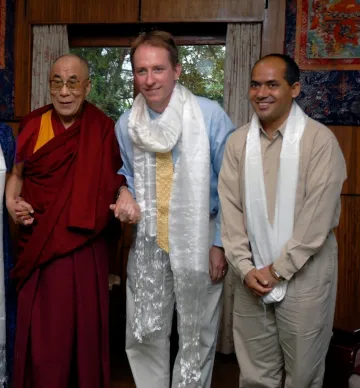The Center for Compassion Studies was established to encourage investigation of the impact of compassion and contemplative practices on individual, group and environmental well-being, as well as to promote the availability of education and training in the cultivation of compassion.

The first of its kind in the Southwest, the University of Arizona’s Center for Compassion Studies joins several institutions of higher education in the pursuit of understanding the impact of the intentional cultivation of compassion, and expanding the availability of evidence-based methods and techniques for those interested in this form of contemplative practice.
Why Compassion Studies?
Secular ethics, including compassion for others, refers to a lack of partiality toward any religious tradition. As a result, secular ethics fosters tolerance and respect of all religious differences. It is not ‘anti-religious’ as it embraces the rich variety of cultural beliefs that exist, while giving preference to none. There is a clear recognition that the cultivation of ethics such as compassion, kindness and altruism are central tenets of all belief systems, and further, are essential to human cooperation and survival.
At its most fundamental level, compassion is the wish to alleviate the suffering of another. Recognized as a desirable and beneficial trait in all major religious traditions and in most secular contexts, our scientific investigations and educational offerings explore the belief that the potential to develop compassion exists in every person, and that it is a quality that can be deliberately expanded and deepened through training, often with great benefits to the individual as well as society at large.
Our Vision
To help build a world in which compassion guides human behavior at all levels, from the individual to the environment.
History

The Dalai Lama XIV, Charles Raison and Geshe Lobsang Tenzin Negi in India
Our founding Director, Charles Raison, M.D., a psychiatrist in the UA College of Medicine, and renowned research scientist of mind-body approaches to mental health, has long been deeply interested in the modern application of ancient healing and spiritual traditions to alleviate mental and physical suffering. Over a decade ago, his interest in researching meditation led him to develop a unique research project studying a secularized form of Tibetan Buddhist lojong compassion meditation with Geshe Lobsang Tenzin Negi, Ph.D at Emory University. Encouraging results from that initial study, and subsequent studies with both adult and youth populations, led to tremendous interest in Cognitively Based Compassion Training (CBCT).
After Dr. Raison relocated to Tucson, The University of Arizona became the first research institution outside of Atlanta to share the teachings of this compassion meditation practice. Soon it became clear that there was an opportunity to convene scholars across the university who have been studying meditation and other forms of contemplative practice and universal ethics to continue to build the bridge between ancient cultures and philosophies and modern science. Through his vision, the Center for Compassion Studies was created to expand the availability of compassion training methods, and to further investigate our understanding of the impact of these powerful methods on the well-being of humanity and our environment.

